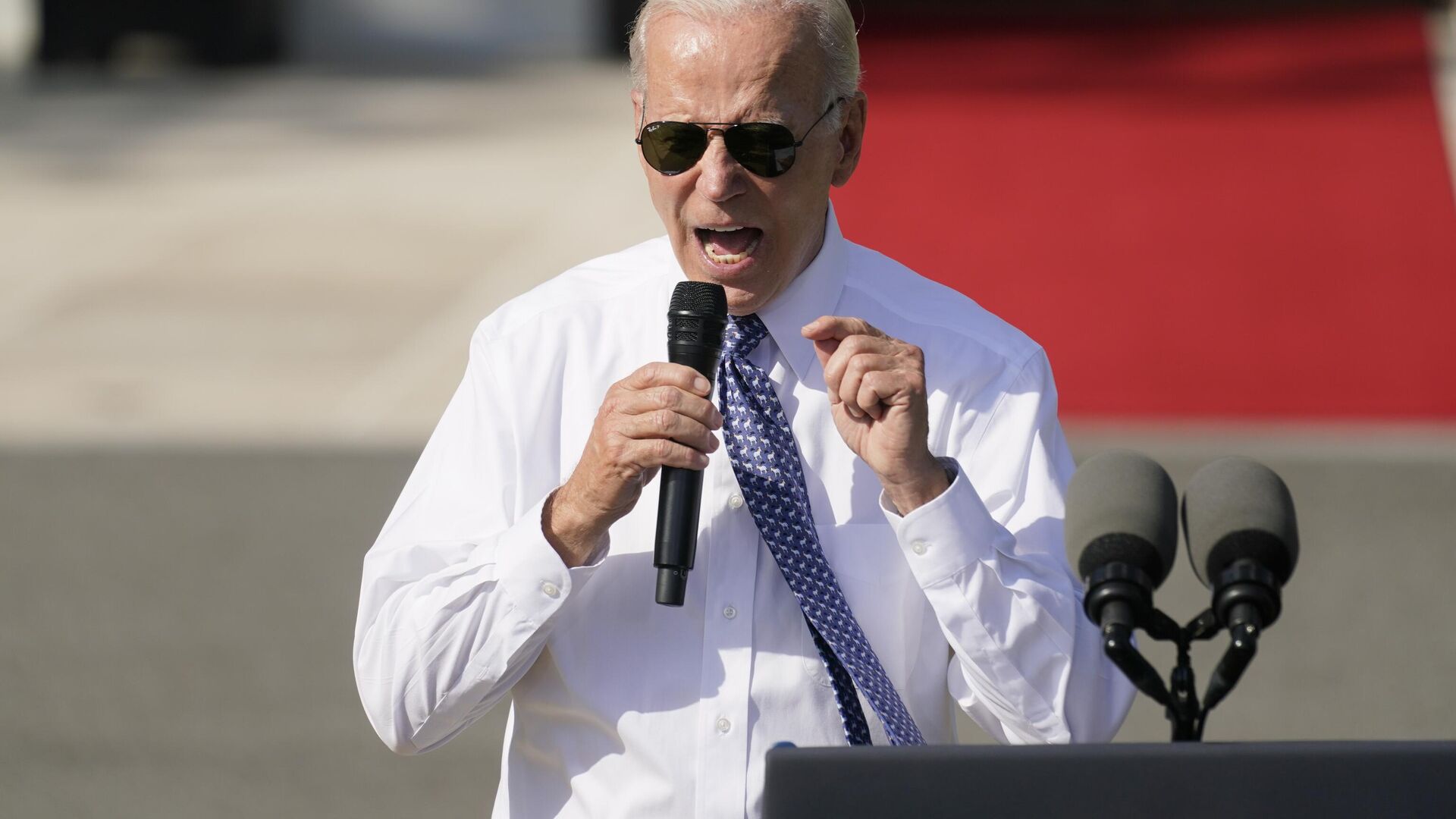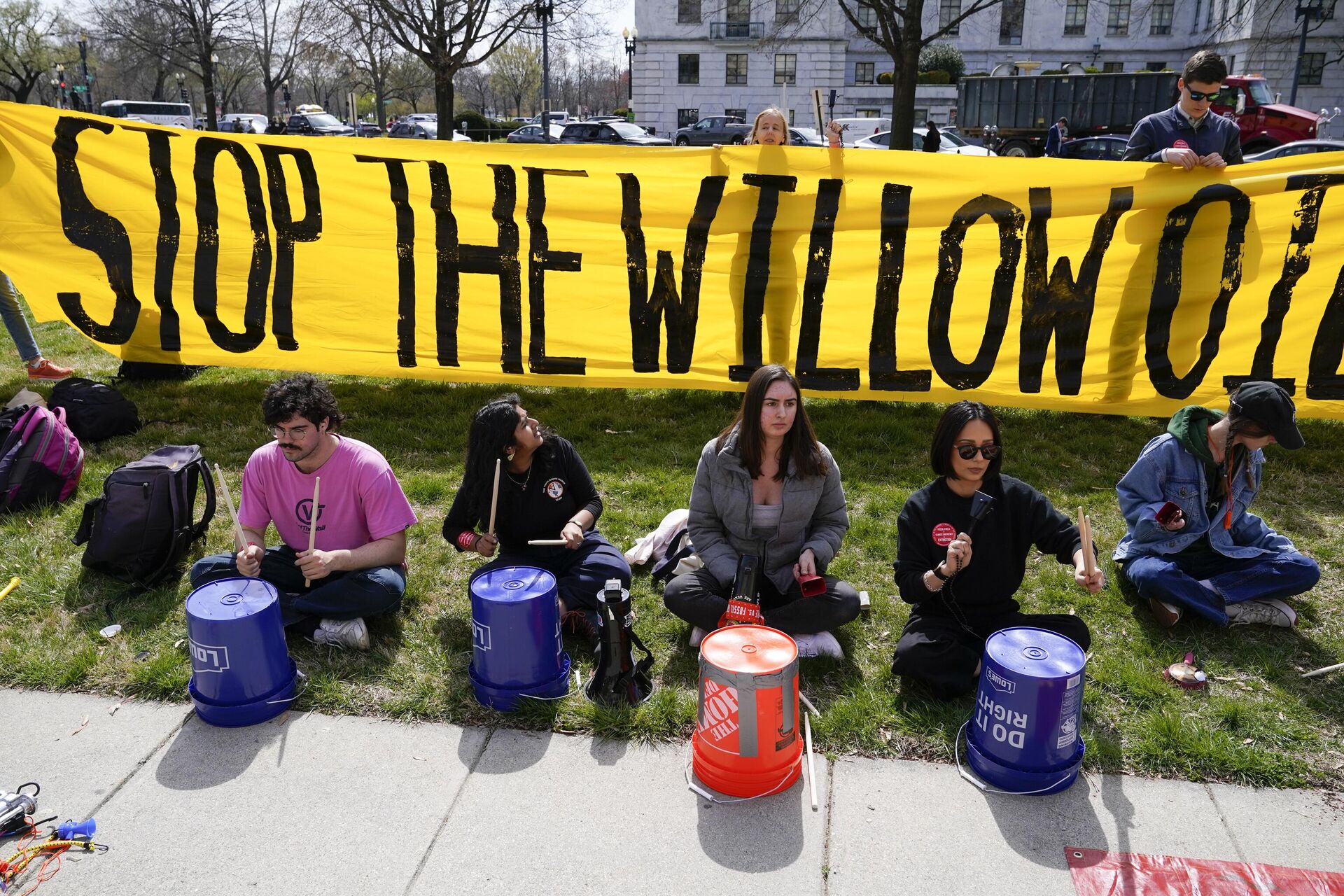https://sputnikglobe.com/20230327/biden-office-criticized--by-progressives-over-willow-project-approval-1108812562.html
Biden Office Criticized by Progressives Over Willow Project Approval
Biden Office Criticized by Progressives Over Willow Project Approval
Sputnik International
The Biden administration is facing backlash from progressive groups and voters over its decision to approve the Willow Project, a massive oil drilling effort in Alaska with topics like #StopWillow trending on social media.
2023-03-27T03:49+0000
2023-03-27T03:49+0000
2023-03-27T03:57+0000
americas
us
alaska
conocophillips
carbon emissions
carbon dioxide
alexandria ocasio-cortez
raul grijalva
biden administration
oil drilling
https://cdn1.img.sputnikglobe.com/img/07e7/03/1b/1108812250_0:160:3073:1888_1920x0_80_0_0_7ba8a8101f8469b01cc7f4dfec684ff1.jpg
Despite the opposition, the administration approved the project because of legal constraints, as leases to drill there were granted years ago. However, the administration has tried to mend fences with environmental advocates by making overtures to the environmental movement, inviting them to voice their concerns.Following the decision, officials with the White House Council on Environmental Quality met with environmental organizations to hear their grievances. However, even more mainstream environmental groups that are typically allies with the administration expressed their anger, despite the fact that the size of the project was reduced from ConocoPhillips’ original proposal.The administration has also announced a series of moves on conservation, including the proposal of protections for 13 million acres of federally-owned land in Alaska that have significant natural and historic value. Additionally, the administration said it would block 2.8 million acres in the Arctic Ocean from oil and gas drilling, although there has not been a federal lease sale in the Arctic Ocean since 2007.These moves garnered applause from environmentalists, but many said the policies did not make up for the impacts of the Willow Project. Rep. Raúl Grijalva, the former chairman of the Congressional Progressive Caucus and current top Democrat on the Natural Resources Committee, said that the administration will need to do more with regulations, additional land and water protections, and making sure the Inflation Reduction Act benefits to the energy transition.The decision to approve Willow coincided with Biden’s decision to sign a GOP measure overturning a sentencing proposal approved by the city council of Washington, D.C. This has sparked worries on the left that the White House will move further to the center as Biden prepared for an expected reelection run next year.Groups like the Sunrise Movement have said that in the wake of the decision, the Biden administration needs to take other steps, like declaring a climate emergency, to prove his commitment to the issue. Declaring a climate emergency could empower Biden to use the Defense Production Act to speed up production for low-carbon energy technology.Democratic strategist Jon Reinish said that the Biden administration is having to juggle competing crises amid both climate change and high energy prices.However, he noted that with a polarizing conservative figures from GOP, who might be potentially running against Biden in 2024, the administration may need to appeal to more centrist voters."Hate is more motivating than love in such polarized political times, so something tells me that this will not make young voters or single-issue voters stay home," added Reinish.
https://sputnikglobe.com/20230314/what-is-the-willow-project-in-alaska-and-why-is-it-controversial-1108382644.html
https://sputnikglobe.com/20221111/why-wests-sanctions-spree-directly-contradict-its-own-climate-goals-1104028189.html
americas
alaska
Sputnik International
feedback@sputniknews.com
+74956456601
MIA „Rossiya Segodnya“
2023
News
en_EN
Sputnik International
feedback@sputniknews.com
+74956456601
MIA „Rossiya Segodnya“
Sputnik International
feedback@sputniknews.com
+74956456601
MIA „Rossiya Segodnya“
us, alaska oil, willow project alaska, stopwillow, biden administration backlash, raúl grijalva, alexandria ocasio-cortez, carbon emission in us, does biden support green transition, us oil drilling, biden merges with centrists, lefties criticize biden
us, alaska oil, willow project alaska, stopwillow, biden administration backlash, raúl grijalva, alexandria ocasio-cortez, carbon emission in us, does biden support green transition, us oil drilling, biden merges with centrists, lefties criticize biden
Biden Office Criticized by Progressives Over Willow Project Approval
03:49 GMT 27.03.2023 (Updated: 03:57 GMT 27.03.2023) The Biden administration is facing backlash from progressive groups and voters over its decision to approve the Willow Project, a massive oil drilling effort in Alaska. This project has garnered significant opposition, not only from environmentalists but also from young voters broadly, with topics like #StopWillow trending on social media.
Despite the opposition, the administration approved the project because of legal constraints, as leases to drill there were granted years ago. However, the administration has tried to mend fences with environmental advocates by making overtures to the environmental movement, inviting them to voice their concerns.
Following the decision, officials with the White House Council on Environmental Quality met with environmental organizations to hear their grievances. However, even more mainstream environmental groups that are typically allies with the administration expressed their anger, despite the fact that the size of the project was reduced from ConocoPhillips’ original proposal.
The administration has also announced a series of moves on conservation, including the proposal of protections for 13 million acres of federally-owned land in Alaska that have significant natural and historic value. Additionally, the administration said it would block 2.8 million acres in the Arctic Ocean from oil and gas drilling, although there has not been a federal lease sale in the Arctic Ocean since 2007.
"My strong inclination was to disapprove of it across the board but the advice I got from counsel was that if that were the case, I may very well lose… that case in court to the oil company and then not be able to do what I really want to do beyond that," stated Biden.
These moves garnered applause from environmentalists, but many said the policies did not make up for the impacts of the Willow Project. Rep. Raúl Grijalva, the former chairman of the Congressional Progressive Caucus and current top Democrat on the Natural Resources Committee, said that the administration will need to do more with regulations, additional land and water protections, and making sure the Inflation Reduction Act benefits to the energy transition.
"You can’t cover up carbon emissions with conservation," Rep. Alexandria Ocasio-Cortez told US media. "The impact of the Willow Project is so extensive and expansive. It is really hard to imagine a way to make up for the carbon emissions."
The decision to approve Willow coincided with Biden’s decision to sign a GOP measure overturning a sentencing proposal approved by the city council of Washington, D.C. This has sparked worries on the left that the White House will move further to the center as Biden prepared for an expected reelection run next year.
Groups like the Sunrise Movement have said that in the wake of the decision, the Biden administration needs to take other steps, like declaring a climate emergency, to prove his commitment to the issue. Declaring a climate emergency could empower Biden to use the Defense Production Act to speed up production for low-carbon energy technology.

11 November 2022, 17:08 GMT
Democratic strategist Jon Reinish said that the Biden administration is having to juggle competing crises amid both climate change and high energy prices.
"Should the president and his administration make every move to politically and policy-wise counterbalance this with further pro-environment, anti-climate change policy? Absolutely," Reinish said.
However, he noted that with a polarizing conservative figures from GOP, who might be potentially running against Biden in 2024, the administration may need to appeal to more centrist voters.
"Hate is more motivating than love in such polarized political times, so something tells me that this will not make young voters or single-issue voters stay home," added Reinish.





